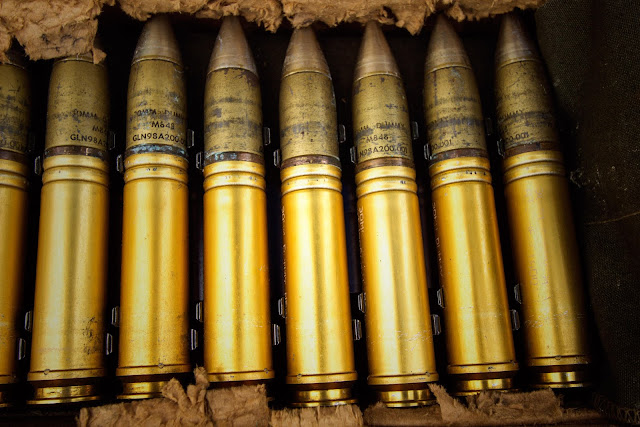We just may be on the edge of nuclear conflict, but you'd never know it from the gold price ..... Ref :- Buttonwood "Not barking yet" , The Economist, Finance and Economics
We just may be on the edge of nuclear conflict, but you'd never know it from the gold price .....
Ref :- Buttonwood "Not barking yet" , The Economist, Finance and Economics

Excuse us for hopping back to last Friday's Economist,
but we're partial to an occasional look into the gold market and hadn't so far
had time to get back to this Buttonwood piece.
One of the most interesting things about the gold market
is how deeply it polarises opinion. We're convinced that above and beyond the
cold fundamentals that dictate the price of gold, there are some traders
naturally predisposed to examine the merits of the yellow metal as an
investment, and some who most definitely are not. Presumably this latter
category did not participate in any large measure in the great bull rally
between 2001 and 2011. One shouldn't be too critical..... even some committed
gold bulls got out much too early -- who
was to know that gold would reach a staggering $1,898 per oz ?
Obviously, not us .....
Bursting bubbles, financial crises and resulting
ultra-low interest rates (QE) that would surely cause a pick-up in inflation
(they didn't) were the prime movers behind that huge move, but the Economist
focuses on political uncertainty and rising inflation as the standard bull
factors behind an upward move in gold.
That being so, the gold price should be through the roof
right now, shouldn't it ? The US has just dropped its biggest ever conventional
bomb in Afghanistan and sent 59 cruise missiles into Syria, relations with
Russia (so chummy just recently) have soured and then there's that small matter
of President Trump's promise to deal with North Korea's nuclear muscle-flexing.
That would seem to fit the bill as far as political uncertainty is concerned
..... what about rising inflation ? Well, the talk since Trump's election
victory has all been about
"Reflation" -- tax cuts and infrastructure spending boosting
the economy and inflation.
It's not as though gold has ignored what's been going on
exactly. The initial reaction to Mr Trump's election victory was to fall from
around the $1,260 level down to about $1,130 at Christmas time as the market
contemplated higher rates and a stronger dollar. But since that time, political
uncertainties and a belief that Mr Trump's plans would spark a sizeable spike
in inflation, along with the dollar's inability to maintain expected strength,
has seen gold up to $1,283 (as we speak).
NOTE : Gold bulls like inflation because gold acts as a
store of value as inflation causes money to lose value. At least that's the
accepted wisdom, but probably only works in the short-term. According to the
Economist, gold's reputation as a hedge against inflation does not always hold
up. Between 1980 and 2000, gold lost 80%
in value in real terms.
The Economist's point is that whilst gold has rallied,
one really could have expected a lot more given the circumstances. The reason
for the comparatively muted reaction lies both with the fundamental supply /
demand situation and a reassessment of how far the President can fulfil his
promises , particularly on tax-cutting.
Gold has no effective industrial use (unlike silver,
platinum and palladium) and relies on jewellery for its demand. In the two
biggest gold markets, India and China, uptake of gold for jewellery fell last
year by 38% and 17% respectively -- though some might point out that India's
consumption figures were skewed by a new excise duty and the abolishment of
large denomination notes.
Perhaps more importantly, faith in the "Trump
Trade" is fading. The failure to repeal Obamacare has undermined
confidence that the president will be able to get his inflationary tax cuts
through Congress in anything like the form intended.
So that leaves gold bulls relying on an escalation in
international tensions or an unexpected spike in inflation, according to the
Buttonwood article. And if that's what they're expecting or even hoping for,
they must be pretty pessimistic people.
That seems a little harsh, and we would probably be safe
in assuming that the Economist are not gold bulls.
NOTE 2 : For what it's worth, the most
successful recent predictor of gold prices, Intesa Sanpaulo SpA, are mildly
bullish for gold to the year end. Daniela Corsini told Bloomberg today that she
sees a year-end price of about $1,350 after a mid-year V-shaped dip due to US
rate hikes. On that note, fading expectation for Trumpflation have seen odds of
a June hike dip below 50% today after being consistently above 60% of late


No comments